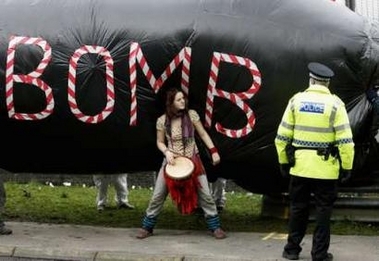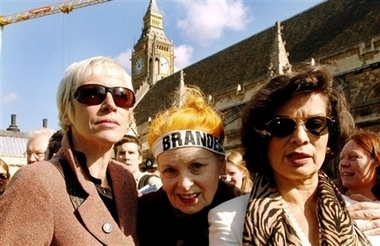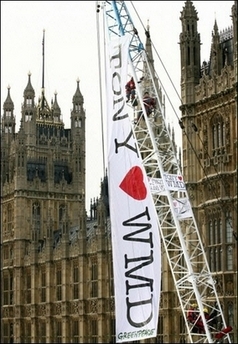Photos - BLAIR BOMB
Jill - 14.03.2007 16:04
Anti-nuclear protestors block a road in Parliament Square in London Wednesday March 14, 2007. Lawmakers from Prime Minister Tony Blair's party planned a major rebellion Wednesday over a proposal for a multibillion-dollar (-euro) nuclear missile defense system - a program critics claim could undermine efforts to stem the weapons ambitions of Iran and other countries. Blair has told the House of Commons that Britain's fleet of four nuclear-armed submarines - due to be phased out from 2022 - should be replaced to meet possible future threats from rogue regimes and state-sponsored terrorists.

A protester stands in front of an inflatable 'bomb'

From left, Annie Lennox, Vivienne Westwood and Bianca Jagger outside Westminster

Greenpeace activists stage an anti-nuclear protest outside Parliament in London
LONDON Lawmakers from Prime Minister Tony Blair's party planned a major rebellion Wednesday over a proposal for a multibillion-dollar nuclear missile defense system a program critics claim could undermine efforts to stem the weapons ambitions of Iran and other countries.
Blair told the House of Commons that Britain's fleet of four nuclear-armed submarines due to be phased out from 2022 should be replaced to meet possible future threats from rogue regimes and state-sponsored terrorists.
Blair is likely to win approval for the program, which he estimates would cost $40 billion, but only with the support of the opposition Conservative Party, which has said it would back the proposal.
"I think it's right we take the decision now to begin work on replacing the Trident submarines, I think it's essential for security in an uncertain world," Blair said during his weekly question period in the House of Commons before the debate and vote.
"Though it is impossible to predict the future, the one thing that is certain is the unpredictability of it."
Conservative leader David Cameron said his party supported the plan to replace the submarines, but asked Blair to guarantee he would stand by Wednesday's vote and not appease Labour rebels.
"I entirely understand and respect the views of people who hold a different view on this," Blair said, "but I have been very firm on this and I will continue to be."
Around 100 lawmakers, including 60 from Blair's own governing Labour Party, planned to reject the proposal, instead backing an amendment urging the government to delay ordering replacement nuclear submarines.
Two junior members of Blair's government have resigned in opposition to the proposal. The Labour Party abandoned its long-held policy of unilateral nuclear disarmament in the late 1980s, but significant numbers of party members continue to press for Britain to scrap its nuclear arsenal.
Protesters, including Bianca Jagger, singer Annie Lennox and designer Vivienne Westwood, gathered near the Houses of Parliament before the vote. Anti-nuclear campaigners say the Trident system could cost three times as much as the government's estimate.
"They are just like little schoolboys that don't think," Westwood said. "If (only) Tony Blair had any idea of his children's future it's so dangerous."
Blair, who has announced he would step down by September, has said the country's stock of nuclear warheads, made up exclusively of the submarine-launched missiles, would be cut from 200 to 160.
But the issue of replacing current warheads, expected to remain in service until the 2020s, was not to be considered before 2009.
Rebels will table a motion claiming the case for renewing the missile system has not been proven, a position supported by ex-Soviet leader Mikhail Gorbachev.
"We are about if we are not careful to be bulldozed into rearming this country," said Jon Trickett, a rebel Labour lawmaker, adding Britain risked damaging its credibility at upcoming international disarmament talks.
"How will it look if the UK gets to the disarmament conference if we have already decided to re-arm?" he said.
In a March 8 letter to The Times of London, Gorbachev said Blair's "rush to deploy nuclear missiles whose service life would extend until 2050 is, to say the least, astonishing."
He claimed the plan risked placing further strain on the Nuclear Non-Proliferation Treaty and hampering efforts to halt Iran's nuclear program, which Tehran insists seeks to create civilian nuclear power, but the U.S. and allies contend is being used as a cover for weapons development.
Anti-nuclear campaigners also claim the system could cost three times as much as the government's estimate.
 Website: http://smart.tin.it/rancinis/notbush.html Website: http://smart.tin.it/rancinis/notbush.html
|



